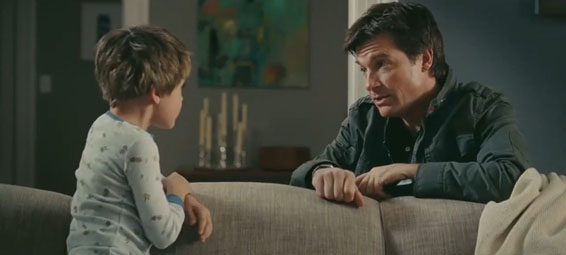The problem with The Switch is not its ridiculous premise. In the movie, the best friend of a woman on the verge of artificially impregnating herself with a donor’s sperm switches out “the seed” with his own while in a drunken stupor at a party. Outrageous as it sounds, that setup is the brainchild of Pulitzer Prize-winning author Jeffrey Eugenides, a writer who has proved more than able at creating head-turning social critiques by introducing elements of contemporary sexual eccentricity (like his hermaphrodite narrator / main character in Middlesex). What should turn you off about The Switch is that the movie spoils this absurd setup by candy coating it, delivering instead an awkwardly constructed, sporadically funny romantic comedy that is only vaguely similar to Eugenides’ short story, “Baster,” upon which the movie is based.
The best friend is Wally Mars (Jason Bateman), a beady-eyed man child (as a crazy homeless man describes him in a rare funny scene early on) who is a neurotic hypochondriac. His best friend Kassie (Jennifer Aniston) doesn’t believe she will ever find a companion, and nervous about getting old, she decides to have a child. This sends Wally into his own nervous fits. He used to date Kassie, and he feels pushed aside as Kassie tries to find a suitable donor. She settles on the confident and manly Roland (Patrick Wilson), a feminist literary theory professor at Columbia. Kassie throws a tacky “I’m Getting Pregnant” party the night she plans on mixing it all up, and self-pitying Wally gets drunk and makes the switch. Kassie does get pregnant, she moves out of New York, and the film jumps seven years ahead to her return to the Big Apple with her son Sebastian (Thomas Robinson). Almost immediately Wally notices character similarities with his son, but having been too drunk to remember the evening of the switch, he only gradually realizes why Sebastian is so much like him.
Bateman is as effective as he can be as this doting, loser-type, and Thomas Robinson’s cute-kid routine adds some genuine moments late in the film. Sebastian is a neurotic little kid who collects picture frames and leaves the photos that come in them, creating narratives about fake family members and histories. When Bateman and Robinson work through these moments, you get glimpses of what The Switch could have been – a neo-family comic drama in the vein of The Kids Are Alright that shows its characters grasping at an innate desire for parental love, and suffering from their lack of it. But The Switch keeps things too light. Kassie and Wally never really confront their situation head on, and pouting is a stand-in for suffering. The movie tries to paint Wally as an indecisive Hamlet, but it dresses this update with a fuzzy Hollywood feeling that no matter what happens, things are going to work out in the end.
In an interview on the New Yorker’s book blog, Eugenides says of The Switch, “You might say that ‘Baster’ is to ‘The Switch’ what cello is to cellophane.” Comparing The Switch to cellophane is more than a clever linguistic putdown. Eugenides’ ingenious choice of words gets at the film’s tonal character that precludes it from achieving what Eugenides set out to do in his story. Cellophane is plastic, translucent, and used to cover up leftovers before packing them away in the fridge. Analogously, The Switch’s characters are flighty and cheap, its action is incessantly explained (sometimes through intrusive voiceovers), and the story’s two successful elements – an ongoing Hamlet reference and an interesting use of picture frames as an image of familial desire – are effective enough to seem out-of-place.






